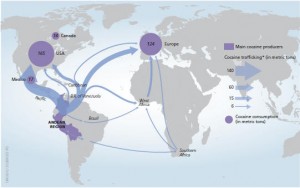Colombian and American War on Drugs
Last Friday, Colombian President Juan Manuel Santos announced the death of Victor Ramon Navarro-Cerrano, a Colombian drug lord commonly known as “Megateo”. Navarro-Cerrano led the Librado Mora Toro Front of the communist, militant group known as El Ejercito Popular de Liberacion (EPL; Popular Liberation Army) which is said, by the U.S. Department of State, to grow coca, operate cocaine production labs (predominantly located in the Colombian Amazonia), and sell their cocaine products, by the metric tons, to buyers in North America, Europe, and the Caribbean. Colombian and U.S. officials – who offered a reward of up to 5 million dollars for any information leading to his captivity – equally champion the death of the drug lord, as he is credited with having influenced corrupt Colombian officials into facilitating drug shipments around the world.
Colombia’s decades-old, drug-trafficking history has been characterized by American military intervention, corruption within the federal government, assassination of state officials, and cartel wars. The Colombian drug industry experienced its highest peak in the 1980’s with the rise of the Medellín Cartel, led by Pablo Escobar, and the Cali Cartel. Colombia became an increasingly violent and dangerous country with the drug cartels’ rise to social, political, and economic power in the country. During that time, the South American state faced increasing threats from guerrilla groups who aimed to combat attacks from the federal government, its military, and that of the United States.
The United States has had a long history of intervention in Colombia, dating back to the 1950’s when the U.S. military sponsored a Colombian national security initiative to deter citizens from engaging in procommunist activities or groups and to eliminate marxist threats. Since 2000, the U.S. has given 5 billion dollars to Colombia under “Plan Colombia” – an American aid package that was created to combat drugs-trafficking promote peace, primarily by means of military assistance. According to Amnesty International, the U.S. has assisted Colombia with more that 8 billion dollars, most of which went to military funding, over the last 10 years, however, “US policy has failed to reduce availability or use of cocaine”. This reveals that although U.S. intervention in Colombia has helped destroy the most dangerous cartels of the late twentieth century and has aided in the breakdown of guerrilla groups, threats related to drug-trafficking and militant groups persist.
While I personally believe that the United States should continue assisting Colombia in efforts to combat drug-trafficking and militant groups, which have forcefully displaced thousands of people into neighboring countries, I understand the frustration some Americans may have regarding this issue. It has been more than 60 years since the Unites States began military intervention in Colombia and has spent billions of dollars in assistance to the Colombian military and law enforcement, yet, it has not ultimately ‘won’ the war against drug trafficking and guerrilla groups. Therefore, one may ask, if more than 60 years of military assistance and billions of dollars in aid have not yielded the results that were hoped for, when is it appropriate for the United States to retreat from intervention in a region where it is no longer obtaining results? While I do not have an absolute answer to this question other than, “when the threat is destroyed,” I believe that U.S. intervention in Colombia continues as a result of a lack of awareness of the issue by the American public. Take for instance the multiple wars fought by the United States in which public opinion was a significant driving or opposing force. In a democratic state, officials ultimately seek reelection and when in war, they seek to quickly end wars to manage and increase their approval ratings by using the success of a war effort. In those cases, the public was well aware of said issues and circumstances. In this case, however, most of the American public is unaware of the long and costly fight against Colombian drug traffickers and militant groups; therefore, there is not much public opinion to continue or to oppose the fight against those the Colombian and American government disapprove of. That being said, government officials may act, at least, more ‘freely’ when approving or disapproving international operations since the public is not for or against said interventions.
